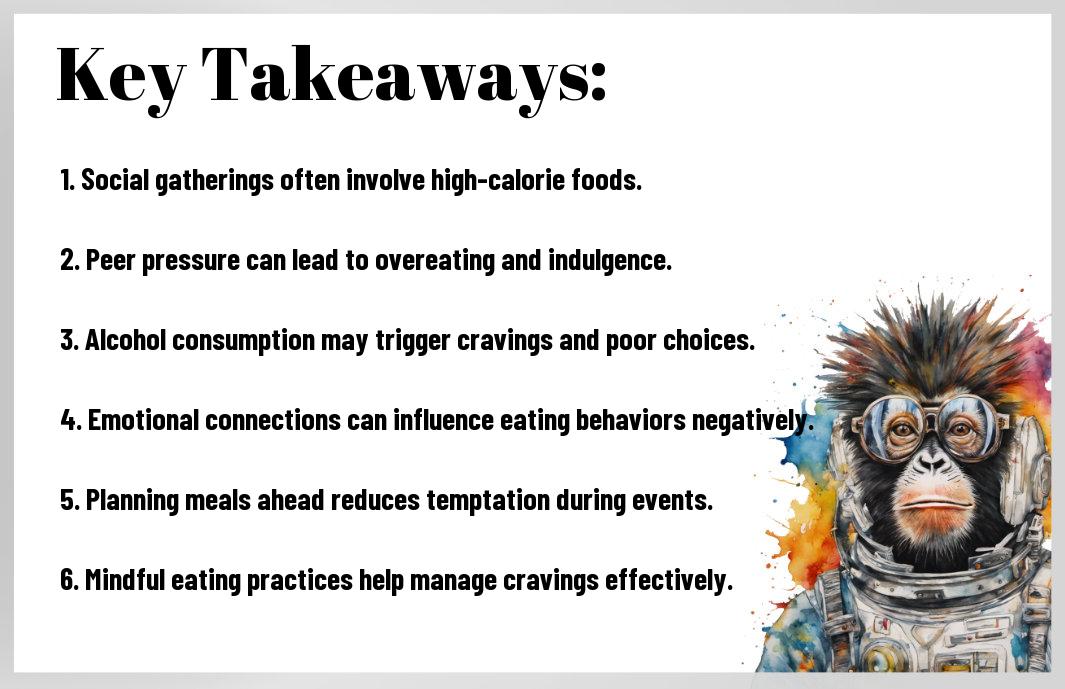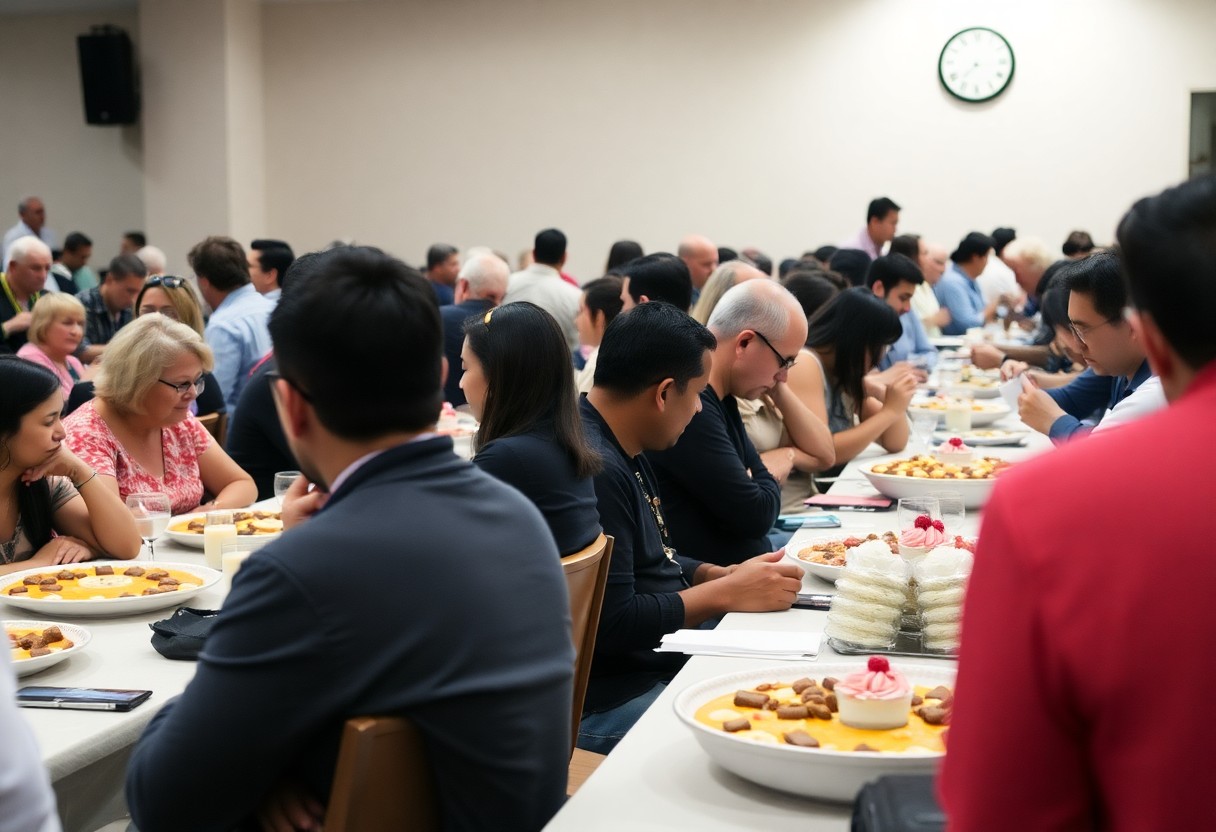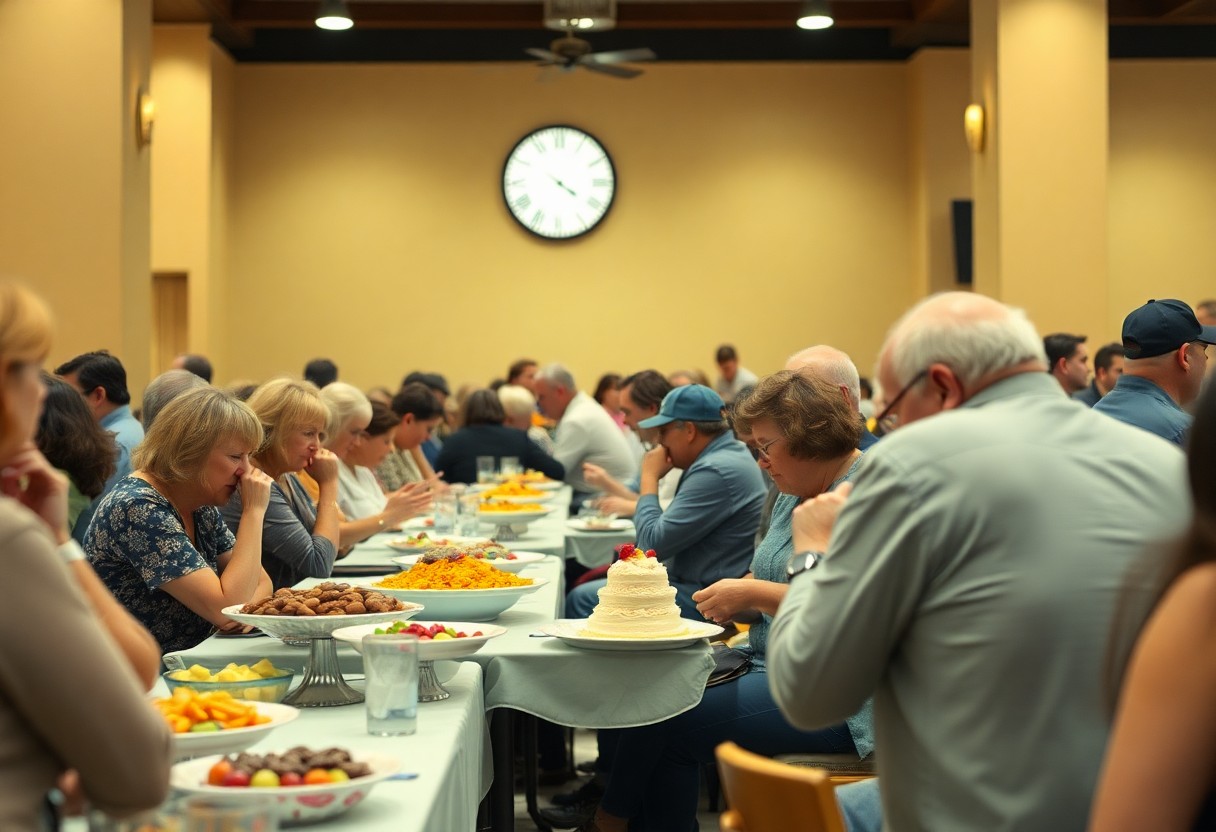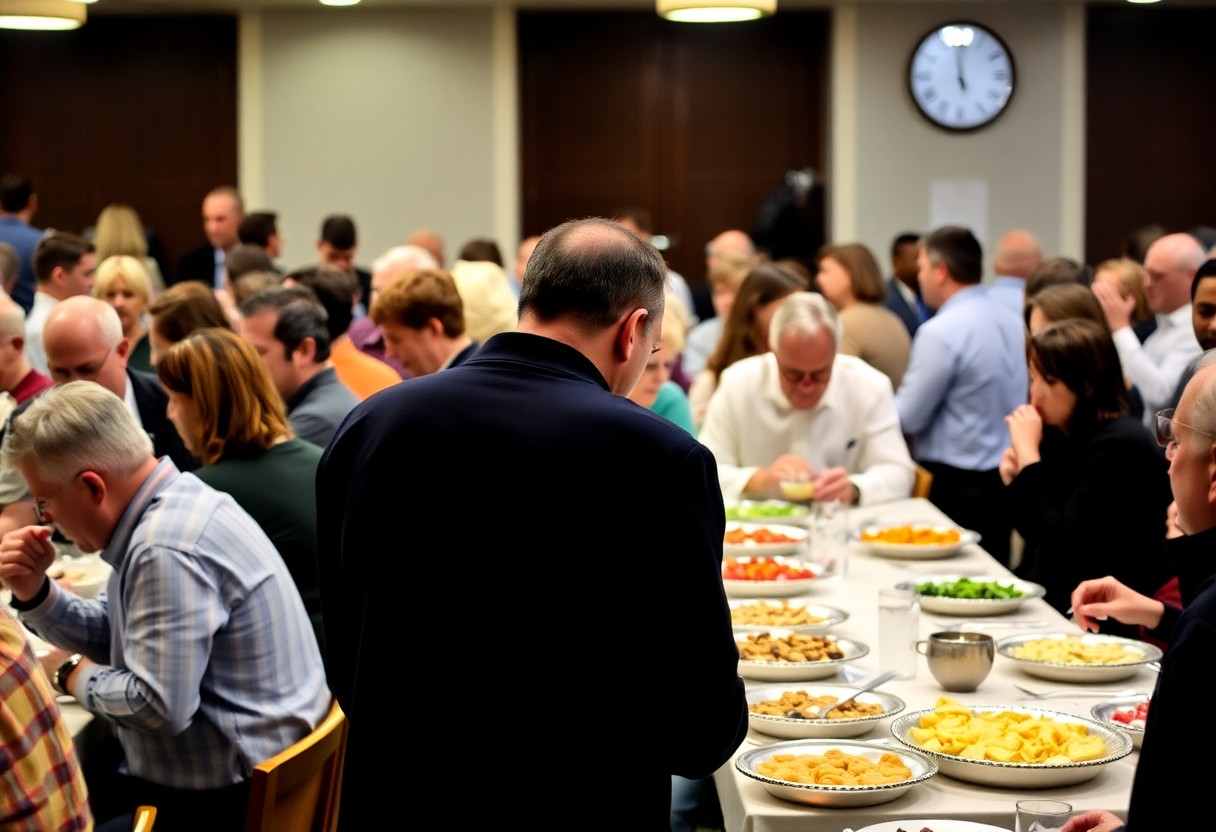Overeating can often feel inevitable during social events, where the abundance of tasty treats and peer pressure to indulge can lead you down a slippery slope of cravings. I understand that the joy of gathering with friends may clash with your goals for healthy eating. It’s important to recognize how these *tempting environments* can impact your *ability to maintain control*. In this post, I will explore the factors that contribute to this struggle and offer *strategies to help you stay on track* without missing out on the fun.
Key Takeaways:
- Social situations often involve abundant food and drink, which can trigger overeating and cravings, making it challenging to maintain healthy eating habits.
- Being mindful of your eating patterns during social events can help you navigate temptations and make better food choices without feeling deprived.
- Having a plan in place, such as pre-eating a healthy snack or setting limits on indulgences, can empower you to enjoy social gatherings while staying aligned with your health goals.
Understanding Overeating and Cravings
For many individuals, the battle against overeating and cravings is a complex journey. It’s not just about willpower; it encompasses emotional, psychological, and social dimensions that often complicate our eating habits. Social events can amplify these challenges, making it more difficult to stick to personal health goals. To navigate these issues effectively, understanding the underlying mechanisms of our cravings is imperative. If you find yourself struggling, What to Do If You Feel Like Binge Eating: 8 Tips can provide practical strategies to regain control.
The Psychology Behind Cravings
Before venturing into the triggers of overeating, it’s vital to acknowledge the psychological components that drive cravings. These cravings are often tied to emotional states rather than physical hunger. When I experience stress, anxiety, or even boredom, my brain may signal a desire for comfort food. This relationship between emotions and food is not uncommon; it reflects a coping mechanism where food becomes a source of comfort during turbulent times.
Triggers of Overeating
Above all, recognizing triggers that lead to overeating is an integral part of managing these habits. Triggers can be external, such as the presence of tempting foods at social gatherings, or internal, like feelings of loneliness or anxiety. These triggers often make it hard to resist indulging in excessive amounts of food, especially when I find myself in situations that are laden with emotional baggage.
At social events, the temptation to overeat can be overwhelming due to constant availability of food and drink, along with the pressure to indulge in celebrations and traditions. This environment makes it important to identify your personal triggers, as they can often lead to habits that hinder your long-term health goals. Engaging with others while still keeping your eating habits in check can be a challenge, but being aware of your triggers can significantly enhance your ability to make healthier choices even in the most tempting situations.

The Role of Social Events
You might find that social events frequently challenge your efforts to manage overeating and cravings. It’s important to recognize that the environment of these gatherings can significantly impact your eating behaviors. In particular, the social pressure to indulge in food and drink can be overwhelming. You may feel compelled to join in when others are celebrating with festive snacks or rich meals. This type of social support often comes with unspoken expectations that can lead you to abandon your dietary goals simply to fit in. Your ability to resist temptation is tested by the collective enjoyment around you, making it harder to stay committed to your choices.
Social Pressure and Eating
Role models in your social circle also play a key part in your eating habits during events. The atmosphere may inadvertently drive you to overeat because you notice others doing the same. This bandwagon effect may whisper to you that to enjoy the occasion fully, you need to indulge as passionately as everyone else. I acknowledge that navigating these influences is challenging, particularly if you are striving for change. The temptation to indulge is often viewed as synonymous with having fun, leading to the belief that prioritizing your health might make you less sociable or less appreciated in the eyes of your peers.
Alcohol and Food Choices
Any drink served at social events often comes with an array of food choices that can influence your eating patterns. After consuming alcohol, your inhibitions can be lowered, making it easier to lose track of your portion sizes or to opt for less healthy food options. The combination of alcohol and hunger can create a perfect storm for overeating, as you may find yourself reaching for high-calorie snacks you’d typically avoid when sober. Additionally, the interplay between alcohol consumption and food choices can also steer you toward dishes that are more indulgent and less aligned with your goals.
Pressure to drink can further skew your food decisions, as social norms often tie alcohol consumption to celebration and bonding. You may feel compelled to join others in drinking, which can lead to a tendency to spend less time considering what you are eating. The post-drinking munchies can be particularly intense, where craving savory, fatty, or sweet foods can override your better judgment. Recognizing and navigating these dynamics in social settings can be instrumental in maintaining control over your eating habits.
Strategies to Manage Cravings at Social Gatherings
Once again, navigating social events can often feel like a battle against your own desires, especially if you are trying to maintain control over your eating habits. The pressure to indulge in appetizers and desserts can heighten cravings, making it increasingly difficult to stay on track. However, with some effective strategies, you can enjoy these gatherings without derailing your efforts to manage your eating habits. It’s all about being proactive and employing techniques that keep you grounded in your goals.
Mindful Eating Techniques
Cravings often arise from a rush of emotional triggers, and engaging in mindful eating techniques can help you regain control. I have found that slowing down and truly savoring each bite can make a significant difference. By focusing on the flavors, textures, and even the smells of food, I become more aware of my body’s signals of hunger and fullness. This practice allows me to genuinely enjoy the food while avoiding the tendency to overeat due to distractions or social pressures.
Planning Ahead
With a little foresight, you can set yourself up for success at social gatherings. By knowing the menu in advance or suggesting healthier options when planning the event, I can navigate the choices with confidence. Additionally, having a small snack before the event can prevent overwhelming cravings and help you feel more in control when faced with delicious treats. This proactive approach not only mitigates the impact of tempting foods but also encourages me to make choices aligned with my health goals.
At times, I have found that preparing a few healthy snacks to bring along can serve as an effective strategy. By doing this, I can ensure I have options that align with my eating plan while also participating in the communal sharing of food. Not only does this aid in managing my cravings, but it can also inspire others at the gathering to consider healthier alternatives. This preparation transforms the experience into one that is enjoyable and supportive of my goals, rather than an overwhelming challenge.

The Impact of Social Norms on Eating Habits
After spending time at social gatherings, I often find myself reflecting on how these events influence our eating habits. Social norms around food can significantly affect our perceptions of what is considered appropriate or acceptable when it comes to eating. From birthday parties filled with cake to holiday feasts overflowing with delicious dishes, the pressure to indulge often feels overwhelming. You might feel compelled to participate in eating more than usual simply because everyone around you is doing so, which can derail your attempts to control overeating and manage cravings.
Cultural Influences
Eating is deeply intertwined with culture, and our cultural backgrounds greatly influence our eating behaviors. Different cultures have distinct food traditions that shape our preferences, consumption patterns, and even our emotional connections to food. This can create challenges when trying to navigate social situations, as traditional foods might tempt you, leading to overeating despite your intentions. For example, during family gatherings, the expectation to indulge in beloved dishes may become hard to resist, causing internal conflict between your cravings and desire for moderation.
Peer Influence and Group Dynamics
About social events, the influence of peers can significantly impact your eating choices. When surrounded by friends or family who are indulging, you may feel an unspoken pressure to join in, even if it conflicts with your personal goals. You might find yourself authentically enjoying a moment, only to later regret how much you consumed due to the group dynamic. Social eating can also create a cycle of unhealthy habits, where overeating becomes normalized within your circle, making it difficult for you to establish boundaries.
A common scenario is when you attend a gathering where everyone is sharing large plates of food. The atmosphere is festive and inviting, which understandably makes you want to indulge. However, this can lead to a feeling of obligation to match the consumption levels of those around you, promoting excessive eating without regard for your own hunger cues. Additionally, with each gathering, you may find yourself forming habits that get reinforced over time, showing how peer influence can end up shaping your relationship with food in ways that aren’t always beneficial. Recognizing this dynamic is imperative to overcoming your challenges with overeating and cravings at social events.

Long-term Solutions for Overeating
Many individuals struggling with overeating often seek immediate fixes, but lasting change requires a commitment to long-term solutions. It’s vital to address the deeper reasons behind your eating habits, making lifestyle adjustments that align with your goals. Some effective strategies include establishing healthy boundaries, building a support system, and adopting mindful eating practices. By investing time and effort into these aspects, I can create a more sustainable approach to overcoming cravings and overeating tendencies.
Establishing Healthy Boundaries
Boundaries play a significant role in managing your eating habits. It’s not just about saying no to tempting foods, but rather understanding your relationship with food and the situations that trigger unhealthy eating patterns. I believe that by setting clear boundaries during social events or meal times, I can protect myself from overindulging. For instance, I can decide in advance how many servings I will have or establish rules for myself, such as waiting at least 20 minutes after a meal before considering dessert.
Building a Support System
Across my journey to manage overeating, I recognized the importance of surrounding myself with a supportive network. Friends, family, or even support groups can provide the encouragement and understanding I need when navigating challenging situations. Having someone to share my goals with and who can hold me accountable significantly reduces feelings of isolation and can bring a sense of camaraderie that strengthens my resolve against cravings. By discussing strategies and celebrating achievements together, I can foster a positive environment that encourages healthier habits.
Due to the emotional heavy lifting that accompanies efforts to control overeating, having a robust support system is vital. Knowing that you have people who understand your struggles and champion your progress provides a safety net. This connection can make a substantial difference, allowing me to express my feelings without judgment and ensuring that I feel understood on particularly challenging days. When we share our experiences and coping strategies, we can learn new techniques that can help us thrive, making every small victory worth celebrating.
Case Studies: Real-Life Experiences
All the insights I’ve gathered from real-life experiences show that social events often play a significant role in triggering overeating and cravings. Here are some compelling case studies that highlight this phenomenon:
- Case Study 1: Sarah, aged 32, reported a 25% increase in her calorie intake during family gatherings, driven by emotional ties and food-centric traditions.
- Case Study 2: Tom, 45, noted that his cravings peaked at office parties. He found himself consuming, on average, 400 extra calories per event.
- Case Study 3: Emily, 29, avoided social events for a year but craved connection. She lessened her emotional eating after developing coping strategies, leading to a 15-pound weight loss.
- Case Study 4: Mark, 38, experienced a direct correlation between social engagements and his weight gain, correlating a 50% increase in snacks consumed mainly due to peer pressure.
- Case Study 5: Lisa, 24, discovered that substituting healthier options at social events let her enjoy without the guilt, positively impacting her self-esteem and food choices.
These case studies underline that while social gatherings can offer support and connection, they also pose unique challenges for those managing their eating habits. For further insights, you may want to check out this resource on Weight loss: Gain control of emotional eating.
Success Stories
An invaluable aspect of studying these real-life experiences is uncovering success stories. Many individuals found that implementing mindful eating practices during social events allowed them to indulge without overindulging. Benjamin, for instance, began bringing a healthy dish to gatherings which not only satisfied his cravings but empowered him to make better food choices while also receiving positive feedback from peers.
Many have learned to navigate the complex interplay of societal expectations and personal dietary needs by establishing boundaries. One success story shared by Olivia involves opting for smaller plates at buffets, which helped her manage portion sizes and keep her calorie intake within reason, leading to a 10-pound weight loss over a few months.
Lessons Learned
Any experience in dealing with overeating at social events often involves a steep learning curve. Participants in the case studies I’ve analyzed frequently mentioned the importance of their internal dialogue when it came to food choices. A common theme was recognizing the difference between social pressure and personal well-being.
To truly make a change, it’s crucial to develop a personal set of strategies. Many participants emphasized the value of practicing mindful eating techniques, such as savoring each bite and paying attention to hunger cues. Another critical lesson was understanding that it’s okay to say no to certain foods that don’t serve your health goals. I’ve come to realize that a mindful approach can significantly diminish the pull of social pressures, allowing you to truly enjoy both the company and the food without guilt.
Summing up
Taking this into account, I recognize how social events can significantly impact my efforts to control overeating and cravings. The pressure to conform to social norms, the abundance of food, and the distraction of socializing can lead to behaviors that undermine my dietary goals. I realize that it is necessary to adopt strategies that allow me to engage in social activities without sacrificing my commitment to healthy eating. Whether it’s setting personal boundaries or making mindful choices about what and how much I consume, I can find a balance that lets me enjoy social events without feeling defeated.
Ultimately, understanding how social situations can sabotage my relationship with food allows me to take proactive steps. By being aware of triggers and implementing effective coping mechanisms, I can navigate these events with confidence. I can practice moderation, prioritize healthy alternatives, and focus on the social aspect rather than just the food. Through mindfulness and preparation, I can uphold my goals while still enjoying the company of family and friends, proving that I don’t have to choose between my health and my social life.
FAQ
Q: How do social events impact my eating habits?
A: Social events often feature abundant food and drinks, which can lead to overeating. The social atmosphere may encourage individuals to indulge in foods they might typically avoid, making it harder to stick to healthier choices. Peer pressure and the desire to fit in can also contribute, as people may feel compelled to partake in the offerings of the gathering.
Q: What strategies can I use to manage overeating during social functions?
A: It’s helpful to plan ahead. Consider eating a healthy snack before attending a social event to curb your appetite. Additionally, identify healthier options at the event and focus on those. You can also use smaller plates to help control portion sizes and pace yourself by engaging in conversations rather than solely focusing on eating.
Q: Can I still enjoy social events without sabotaging my goals?
A: Yes, it is possible to enjoy social events while maintaining your nutrition goals. Select a few of your favorite foods in moderation instead of trying everything. You can also offer to bring a healthy dish to share, which gives you more control over your food choices. Engaging in activities other than eating, such as mingling or dancing, can also help shift the focus away from food.
Q: How can I cope with cravings that arise during social gatherings?
A: One way to cope with cravings is to stay hydrated by drinking water or herbal tea, which can help reduce the desire to snack. If cravings hit, take a moment to pause and assess whether you’re truly hungry or simply influenced by the environment. Distract yourself with conversation or activities that don’t revolve around food to help manage these urges.
Q: What if I do overeat at a social event?
A: If you find that you’ve overeaten, don’t dwell on it. Acknowledge the experience and shift your focus to your next meals and activities. It’s important to avoid the all-or-nothing mentality; one event does not define your overall relationship with food. Instead, return to your regular, balanced eating habits, and consider incorporating more physical activity in the following days to help balance out any excess consumption.


0 Comments